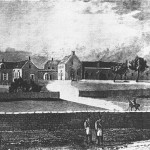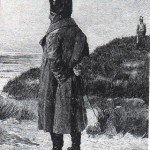The most serious concern Napoleon felt in facing his new life was that he would have no occupation. He saw at once that St. Helena would not be an Elba. He sought conversation, studied English, played games, began to dictate his memoirs. It is to this admirable determination to find something to do, that we owe his clear, logical commentaries, his essays on Caesar, Turenne, and Frederick, his sketch of the Republic, and the vast amount of information in the journals of his devoted comrades, O’Meara, Las Cases, and Montholon.
But no amount of forced occupation could hide the desolation of his position. The island of St. Helena is a mass of jagged, gloomy rocks; the nearest land is six hundred miles away. Isolated and inaccessible as it is, the English placed Napoleon in its most sombre and

Longwood
remote part – a place called Longwood, at the summit of a mountain, and to the windward. The houses of Longwood were damp and unhealthy. There was no shade. Water had to be carried some three miles.
The governor, Sir Hudson Lowe, was a tactless man, with a propensity for bullying those whom he ruled. He was haunted by the idea that Napoleon was trying to escape, and he adopted a policy which was more like that of a jailer than of an officer. In his first interview with the emperor he so antagonized him that Napoleon soon refused to see him. Napoleon’s antipathy was almost superstitious. “I never saw such a horrid countenance,” he told O’Meara. “He sat on a chair opposite to my sofa, and on the little table between us there was a cup of coffee. His physiognomy made such an unfavorable impression upon me that I thought his evil eye had poisoned the coffee, and I ordered Marchand to throw it out of the window. I could not have swallowed it for the world.”

Sir Hudson Lowe
Aggravated by Napoleon’s refusal to see him, Sir Hudson Lowe became more annoying and petty in his regulations. In all over the almost six years in exile, Lowe only saw napoleon six times. All free communication between Longwood and the inhabitants of the island was cut off. The newspapers sent Napoleon were mutilated; certain books were refused; his letters were opened. A bust of his son brought to the island by a sailor was withheld for weeks. There was incessant haggling over the expenses of his establishment. His friends were subjected to constant annoyance. All news of Marie Louise and of his son was kept from him.
It is scarcely to be wondered at that Napoleon was often peevish and obstinate under this treatment, or that frequently, when he allowed himself to discuss the governor’s policy with the members of his suite, his temper rose, as Montholon said, “to thirty-six degrees of fury.” His situation was made more miserable by his ill health. His promenades were so

Napoleon on St. helena
guarded by sentinels and restricted to such limits that he finally refused to take exercise, and after that his disease made rapid marches.
His fretfulness, his unreasonable determination to house himself, his childish resentment at Sir Hudson Lowe’s conduct, have led to the idea that Napoleon spent his time at St. Helena in fuming and complaining. But if one will take into consideration the work that the fallen emperor did in his exile, he will have a quite different impression of this period of his life. He lived at St. Helena from October, 1815, to May, 1821. In this period of five and a half years he wrote or dictated enough matter to fill the four good-sized volumes which complete the bulky correspondence published by the order of Napoleon III., and he furnished the great collection of conversations embodied in the memoirs published by his companions.
Before the end of 1820 it was certain that he could not live long. In December of that year the death of his sister Eliza was announced to him. “You see, Eliza has just shown me the way. Death, which had forgotten my family, has begun to strike it. My turn cannot be far off.”
Nor was it. On May 5, 1821, he died.

Exile on St. Helena
The most serious concern Napoleon felt in facing his new life was that he would have no occupation. He saw at once that St. Helena would not be an Elba. He sought conversation, studied English, played games, began to dictate his memoirs. It is to this admirable determination to find something to do, that we owe his clear, logical commentaries, his essays on Caesar, Turenne, and Frederick, his sketch of the Republic, and the vast amount of information in the journals of his devoted comrades, O’Meara, Las Cases, and Montholon.
But no amount of forced occupation could hide the desolation of his position. The island of St. Helena is a mass of jagged, gloomy rocks; the nearest land is six hundred miles away. Isolated and inaccessible as it is, the English placed Napoleon in its most sombre and
Longwood
remote part – a place called Longwood, at the summit of a mountain, and to the windward. The houses of Longwood were damp and unhealthy. There was no shade. Water had to be carried some three miles.
The governor, Sir Hudson Lowe, was a tactless man, with a propensity for bullying those whom he ruled. He was haunted by the idea that Napoleon was trying to escape, and he adopted a policy which was more like that of a jailer than of an officer. In his first interview with the emperor he so antagonized him that Napoleon soon refused to see him. Napoleon’s antipathy was almost superstitious. “I never saw such a horrid countenance,” he told O’Meara. “He sat on a chair opposite to my sofa, and on the little table between us there was a cup of coffee. His physiognomy made such an unfavorable impression upon me that I thought his evil eye had poisoned the coffee, and I ordered Marchand to throw it out of the window. I could not have swallowed it for the world.”
Sir Hudson Lowe
Aggravated by Napoleon’s refusal to see him, Sir Hudson Lowe became more annoying and petty in his regulations. In all over the almost six years in exile, Lowe only saw napoleon six times. All free communication between Longwood and the inhabitants of the island was cut off. The newspapers sent Napoleon were mutilated; certain books were refused; his letters were opened. A bust of his son brought to the island by a sailor was withheld for weeks. There was incessant haggling over the expenses of his establishment. His friends were subjected to constant annoyance. All news of Marie Louise and of his son was kept from him.
It is scarcely to be wondered at that Napoleon was often peevish and obstinate under this treatment, or that frequently, when he allowed himself to discuss the governor’s policy with the members of his suite, his temper rose, as Montholon said, “to thirty-six degrees of fury.” His situation was made more miserable by his ill health. His promenades were so
Napoleon on St. helena
guarded by sentinels and restricted to such limits that he finally refused to take exercise, and after that his disease made rapid marches.
His fretfulness, his unreasonable determination to house himself, his childish resentment at Sir Hudson Lowe’s conduct, have led to the idea that Napoleon spent his time at St. Helena in fuming and complaining. But if one will take into consideration the work that the fallen emperor did in his exile, he will have a quite different impression of this period of his life. He lived at St. Helena from October, 1815, to May, 1821. In this period of five and a half years he wrote or dictated enough matter to fill the four good-sized volumes which complete the bulky correspondence published by the order of Napoleon III., and he furnished the great collection of conversations embodied in the memoirs published by his companions.
Before the end of 1820 it was certain that he could not live long. In December of that year the death of his sister Eliza was announced to him. “You see, Eliza has just shown me the way. Death, which had forgotten my family, has begun to strike it. My turn cannot be far off.”
Nor was it. On May 5, 1821, he died.